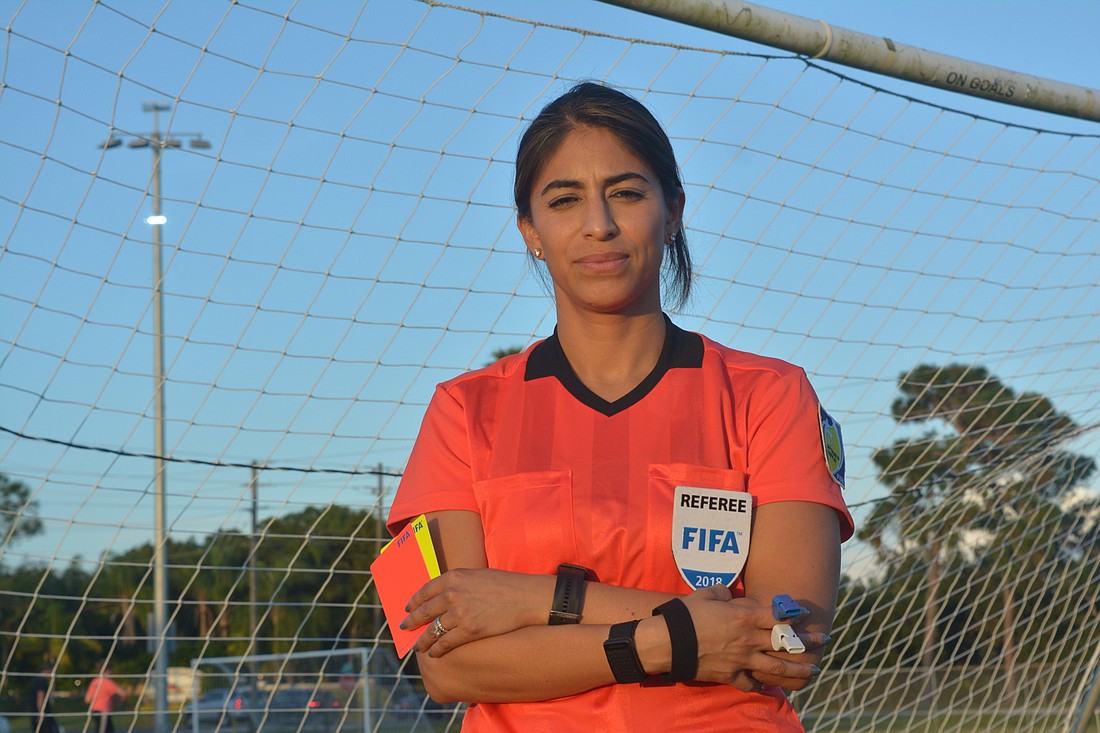- January 4, 2025
-
-
Loading

Loading

After waking up at 4:30 a.m. for hair and makeup, after poring over her notes for hours, after getting last-minute in-ear instructions from a producer, Christina Unkel stood unshaken, ready to address the nation.
The Sarasota lawyer and soccer referee would do this over and over for 33 days — not that she was counting — in Los Angeles, working as Fox Sports’ rules analyst during the 2019 FIFA Women’s World Cup. It was a position she never thought she wanted. Unkel tried out for an on-field referee position for the tournament but was not selected. When Shaw Brown, a producer at Fox Sports, called her last November and asked if she was interested in the gig, asked if she would at least try a game and she how she felt about it, she accepted.
A trial run during the broadcast of a U.S. Women’s National Soccer Team game against Scotland on Nov. 18, a 1-0 USA win, allowed Unkel to see the value she could add to a broadcast, and the pleasure she could derive from it.
“I found that it was mentally stimulating,” Unkel said. “That’s the only reason I referee anymore and this also provided a challenge.
“I have been a referee for 22 years, 10 of those years at the highest level of the sport. Putting that knowledge into 15-second sound bites is challenging. Sometimes, you just know something when you see it. It was my job to connect the gap between the casual fans and the hardcore fans who want a whole play breakdown. I disagreed with some calls, but that wasn’t the point. My job was explaining why the referees called it like they did. I wanted to educate people, that was my mindset.”
The tournament’s refereeing was a source of controversy among some fans and teams. The idea of a video assistant referee, or VAR, made its women’s tournament debut at the World Cup. (It was used on the men’s side in the 2018 World Cup.) The technology is supposed to help on-field referees — who still make the final decisions — see things they would otherwise be unable to see, like if a goalkeeper leaves the goal line early during a penalty kick, and possibly change a call. It also reviews calls that lead to goals or penalties. In the United States’ semifinal game against England, a goal from England’s Ellen White would have tied the game at 2-2 if a VAR review had not retroactively ruled White offside. The United States won 2-1.
While some soccer purists believe the use of VAR goes against the spirit of the game, Unkel brings a different perspective.
“The worst feeling is, as a referee, being the only one to not know whether you got a call right or wrong,” Unkel said. “You are the one with the ability to change things. Sometimes that (VAR) is the only way to see things. That’s why I like it.”
Unkel makes no qualms about being on the side of her colleagues, rooting for them to get calls right more than any particular team, including the United States. Overall, Unkel thinks they did, and attributes much of the controversy to misinformation — from fans, and from the broadcasters informing the fans. One of the most rewarding parts of her experience, Unkel said, came not on air, but off it, in private chats with television personalities picking her brain for expertise. Helping them eliminate misinformation — like blaming new penalty kick and handball rules “introduced” on June 1 for the confusion, when those rule changes had been in the works for years and teams and refs were well aware of how they would be called — does more good than Unkel could do on her own, she said.
Despite being the network’s sole authority on all things rules-related, Unkel said she was never nervous before going on air. Like an athlete entering “the zone” before a match, Unkel was 100% focused on educating the fans, and confident in her ability to do so. Sometimes she was too focused — more than once, Unkel said, she had to turn to a producer after a segment and ask, “What did I just say?”
“It came out intelligent, for the most part,” Unkel said.
Will Unkel continue down the broadcasting path? Nothing is currently lined up, she said, but she would “seriously consider it” if another opportunity arose. For now, she’s content to focus on helping her clients, continuing her referee career and helping the Women’s Sports Museum come to fruition.